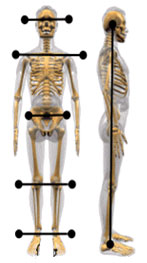Awkward Postures
 These type of movement causes a joint to move beyond its neutral position. This is an uncomfortable or extreme (reaching) movement that can also cause muscle fatigue. In a neutral posture, the body will primarily rely on the structure and alignment of the bones to provide the majority of the support for holding the body up. The muscles will be slightly active to maintain stability around the joints. In this way, minimal forces need to be generated by the muscles and therefore there is minimal risk of injury. However, once any segment of the body moves away from a joint there is an increased force required, and therefore there is an increased risk of injury. The greater the distance it moves, the greater the force demands and therefore the greater the risk of injury. They tend to move loads further away from the body, which increases distance and risk of injury.
These type of movement causes a joint to move beyond its neutral position. This is an uncomfortable or extreme (reaching) movement that can also cause muscle fatigue. In a neutral posture, the body will primarily rely on the structure and alignment of the bones to provide the majority of the support for holding the body up. The muscles will be slightly active to maintain stability around the joints. In this way, minimal forces need to be generated by the muscles and therefore there is minimal risk of injury. However, once any segment of the body moves away from a joint there is an increased force required, and therefore there is an increased risk of injury. The greater the distance it moves, the greater the force demands and therefore the greater the risk of injury. They tend to move loads further away from the body, which increases distance and risk of injury.
Awkward postures can also increase the work forces required for actions because they add hidden loads that must be lifted. The most common type of posture that would demonstrate this effect is back bending. As a person bends forward at the waist to lift a load, they are not only lifting the weight of the load but they also have to lift the weight of the upper body including trunk, head, neck, arms, etc. The greater the hidden load forces required, the greater the risk of injury.
Awkward postures can lead to compromised blood flow to various areas of the body. Working above the heart or placing body parts above the heart requires the heart to pump blood uphill against the force of gravity. In addition, awkward postures may also compress blood vessels because they limit the space provided by a neutral posture and increase pressure in the area. They can also irritate nerves and place increased stress on other tissue such as tendons. Working with bent wrists can place physical stress on the nerves and tendons in the area.
Here are some examples of awkward postures:
- Outstretched Arms
- Leaning
- Raised Elbows
- Overhead Reaching
- Bent Wrist
- Slouching
- Bending
- Turned Neck
- Twisting